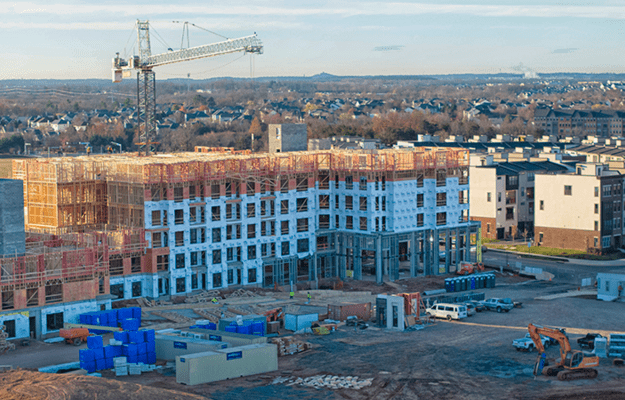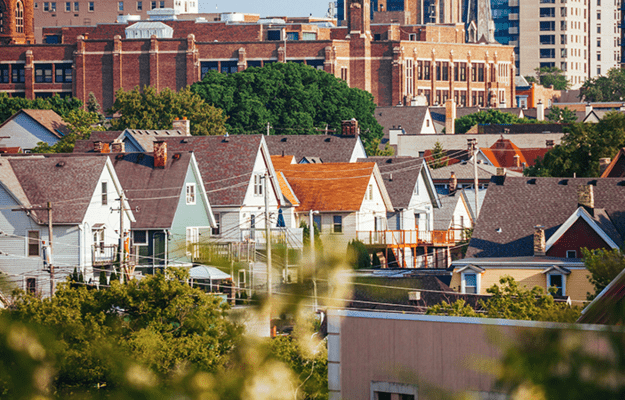
Shaping the Future of a Recovering City: A Focus on Detroit Housing Leadership
by Janae Ladet
Decades ago, Detroit was known for a strong middle class with good manufacturing and blue-collar jobs. The city’s combined economic and housing strengths endured shocks as local manufacturing employment declined and subprime lending fueled a rise in foreclosures. During the foreclosure crisis, media outlets such as the Nation and the Detroit News reported that Detroit lost as much as $1.3 billion in personal wealth, and more than 100,000 Detroit homes fell into foreclosure.
As Detroit strives for economic and housing market recovery, the city’s civic and nonprofit changemakers are engaging the diversity of residents and prioritizing the needs of renters and homeowners across the income spectrum. The process has deliberately focused on inclusive recovery, which is a balancing act to attract new investments while ensuring that long-term residents can still afford to live in the city and benefit from its economic growth and revitalization.
Getting this balance right is a challenge that many recovering cities face. For Detroit, the work is bolstered by a deliberate and collaborative process led by changemakers with long-standing roots in the community. One notable changemaker is Anika Goss-Foster, executive director of Detroit Future City (DFC), a think tank, policy advocate, and innovation engine founded on the principles of inclusion, community, and the development of data-driven strategies.
Goss-Foster has extensive experience in community development in Detroit, from working at both the national and the Detroit Local Initiatives Support Corporation, to a position as director of philanthropic affairs for the City of Detroit, to creating and leading the Next Detroit Neighborhood Initiative. With deep roots and experience in Detroit, Goss-Foster is positioned to take the DFC Strategic Framework plan’s visions around housing and neighborhood revitalization and put them into action. Goss-Foster emphasizes that engaging changemakers in the process of inclusive recovery is crucial: “In places such as Detroit where there is deep disinvestment, understanding the importance of residents and grassroots leadership is equally as important as the technical knowledge of housing and real estate development,” she says. “Practitioners are much more effective when they can colead and cocreate change at the neighborhood level with residents and stakeholders who were already there.”
Rebalancing Detroit’s Housing Market
With the city’s historically high homeownership rate, recovery could easily mean an exclusive focus on rebuilding sustainable homeownership. Though access to homeownership is part of the plan, so too are other housing options vital to the diverse households that call Detroit home (or want to). DFC under Goss-Foster has placed an emphasis on housing for all residents.
Diverse housing options [are] critical to developing an inclusive and stable foundation for Detroit’s future. The future of Detroit is being intentional by investing in diverse, quality housing for all income levels in every neighborhood. —Anika Goss-Foster
The number of renters in Detroit has surpassed homeowners for the first time since 1950. According to a DFC report on the city’s rental market, 60 percent of the city’s renters face housing cost burdens (defined as spending more than 30 percent of income on housing), and 37 percent are spending more than half their income on rent.
The Urban Institute’s research shows a growing demand for affordable, stable, and healthy rental housing for both young age groups and aging households. As of May 2018, there are more than 5,400 units of new market-rate multifamily housing in the planning stages or under construction in Detroit, a peak in activity since the Great Recession. Although many of the city’s rental properties charge low rents, even these are inaccessible to many low-income Detroiters. In 2015, one-third of Detroit households made less than $15,000 a year. The city’s poverty rate, at 39 percent, is more than twice the national average. Preserving and constructing rental housing will address part of the mismatch between supply and demand, but for many low-income Detroiters, rental housing needs to be paired with subsidies.
Detroit’s housing affordability problem does not begin with market conditions; it begins with income. The income in Detroit is too low, and there are too many “poverty pockets” that prevent families from moving from renters to homeowners. There must be intentional strategies to link pathways to higher income to better housing options. —Anika Goss-Foster
The city and its partners have responded with robust efforts to preserve and develop affordable housing. A $250 million multifamily affordable housing fund aims to preserve 10,000 existing and at-risk affordable housing units in neighborhoods across the city and develop 2,000 new affordable housing units, including supportive housing for chronically homeless people.
In another effort to preserve affordable housing, the city passed an inclusionary zoning ordinance amid criticism from both low-income housing advocates and development advocates. The former see the ordinance, which applies to a small segment of the market and sets the affordable share based on 80 percent of area median income, as doing little to address the city’s current affordability challenges. The latter argue that the requirement would reduce developers’ interest in building in the city.
Goss-Foster notes that the new inclusionary zoning policy is a “positive first step in protecting neighborhoods from potential gentrification and displacement. Eighty percent of the area median income for the region is obviously not enough to meet the growing need of true affordability in Detroit, but without a clear policy and precedent in place, there will be little that can be done to protect these neighborhoods in the future.”
Another dimension of the housing challenges DFC is addressing would preserve affordable and high-quality single-family homes. Single-family homes make up 67 percent of the city’s housing supply. DFC, alongside partner community development corporations, community development financial institutions, and community partners, is leading the single-family housing strategy through the Detroit Neighborhood Housing Compact. The compact is a forum for collaboration and collective action by public, private, and nonprofit stakeholders to strengthen the single-family housing system in Detroit neighborhoods. DFC is a convener and connector of the compact and has emphasized collaborative leadership and inclusive engagement. A formal launch of the compact is expected to be announced in summer 2018.
Photo by Ehrlif/Shutterstock


